Authors (Quillette): It might seem odd to recommend a thriller by a British author as a source of information about the ancient enmity between Russia and the Ukraine, but Frederick Forsyth is no ordinary novelist and his books are not ordinary novels. Forsyth is so knowledgeable about so many things that his name appears all over Wikipedia, not just on pages dedicated to his works.
author as a source of information about the ancient enmity between Russia and the Ukraine, but Frederick Forsyth is no ordinary novelist and his books are not ordinary novels. Forsyth is so knowledgeable about so many things that his name appears all over Wikipedia, not just on pages dedicated to his works.
 Games (Venture Beat): After 60 years, an albino swordsman is finally getting the video game treatment. For the first time since the 1961 publication of Michael Moorcock’s novel Elric of Melniboné, the legendary dark fantasy series is going to be the basis for a video game, as Runatyr has acquired the rights to make a computer game based on the first six books of the Elric saga.
Games (Venture Beat): After 60 years, an albino swordsman is finally getting the video game treatment. For the first time since the 1961 publication of Michael Moorcock’s novel Elric of Melniboné, the legendary dark fantasy series is going to be the basis for a video game, as Runatyr has acquired the rights to make a computer game based on the first six books of the Elric saga.
Comic Books (Bleeding Cool): BÊLIT & VALERIA: Swords vs. Sorcery #1, by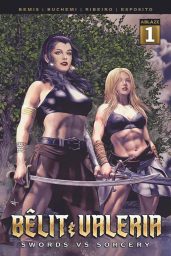 Max Bemis and Rodney Buchemi • MSRP: $3.99 • Release Date: May 4th ROBERT E. HOWARD’S HYBORIAN AGE UNLEASHED! See its true skull-cracking barbarian nature, its unrestrained blood-splattering violence, mayhem, and sexuality!
Max Bemis and Rodney Buchemi • MSRP: $3.99 • Release Date: May 4th ROBERT E. HOWARD’S HYBORIAN AGE UNLEASHED! See its true skull-cracking barbarian nature, its unrestrained blood-splattering violence, mayhem, and sexuality!
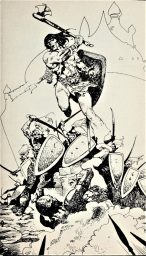 Robert E. Howard (Sprague de Camp Fan): The Flame Knife” was first published in Tales of Conan, Gnome Press, 1955. It is a L. Sprague de Camp rewrite (posthumous collaboration) of a then unpublished novella by Robert E. Howard. The REH original featured Francis X. Gordon (El Borak) as the hero. It is the fourth and last story in Conan the Wanderer, Lancer Books, 1968. It was republished as a standalone illustrated novella titled Conan: The Flame Knife, Ace Books, 1981.
Robert E. Howard (Sprague de Camp Fan): The Flame Knife” was first published in Tales of Conan, Gnome Press, 1955. It is a L. Sprague de Camp rewrite (posthumous collaboration) of a then unpublished novella by Robert E. Howard. The REH original featured Francis X. Gordon (El Borak) as the hero. It is the fourth and last story in Conan the Wanderer, Lancer Books, 1968. It was republished as a standalone illustrated novella titled Conan: The Flame Knife, Ace Books, 1981.
Science Fiction (John C. Wright): Is there a difference between science fiction and fantasy? Is the difference real? Is it arbitrary? Does it matter these days, even assuming it ever did? My theory is that genres are defined and ultimately enforced by the book-buying audience, despite the theorizing of editors and commentators and gatekeepers.
Myself, I am a fan and even a partisan of the Pulp Magazine approach to writing, which is to emphasize action, color, spectacle, a sense of wonder and magic, and the heights and sorrows of the human passion.
Tolkien (Arkhaven Comics): Big shock, it’s not about Lord of the Rings.
It couldn’t be more obvious what happened. The production company had its own 2022 fantasy story they wanted to tell. Basically, nothing but a rip-off of Game of Thrones.
But it is 2022. They have to make it Woke AF because everyone in Hollywood is terrified of being seen as not Woke. At the moment it’s an instant career ender especially if you are white. And they knew that their story would never sell in 10,000 years.
Edgar Rice Burroughs (M Porcius): My Ballantine paperback copies of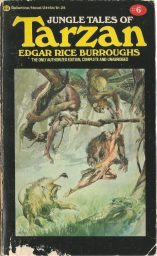 Jungle Tales of Tarzan (I have a Richard Powers one and a Neal Adams one) try to pass off the book as a novel, but, in fact, its twelve chapters are all short stories that appeared in the magazine Blue Book in 1916 and 1917. (To see the covers of the issues of Blue Book in which these twelve tales made their debuts, follow this link to ERBzine.
Jungle Tales of Tarzan (I have a Richard Powers one and a Neal Adams one) try to pass off the book as a novel, but, in fact, its twelve chapters are all short stories that appeared in the magazine Blue Book in 1916 and 1917. (To see the covers of the issues of Blue Book in which these twelve tales made their debuts, follow this link to ERBzine.
D&D (Grognardia): After writing my post on double damage and “instant death,” I started looking into the history of critical hits in roleplaying games. In doing so, I came across an installment of Gary Gygax’s “From the Sorcerer’s Scroll” column in issue #16 of Dragon (July 1978). Among many other topics, Gygax touches on the topic of critical hits. This is, I believe, the first time he specifically addresses the topic in print (though I’m prepared to be corrected, if I’ve overlooked an earlier text on the subject).
Fantasy (Goodman Games): The success of The Lord of the Rings in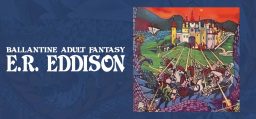 paperback led to a fantasy boom in publishing — and in particular a boom at Ballantine. In the wake of Tolkien’s success, they turned to fellow English fantasist E.R. Eddison for more fiction in a similar vein, re-publishing both his landmark 1922 novel The Worm Ouroboros, but also the three books in his 1930s Zimiamvian Trilogy.
paperback led to a fantasy boom in publishing — and in particular a boom at Ballantine. In the wake of Tolkien’s success, they turned to fellow English fantasist E.R. Eddison for more fiction in a similar vein, re-publishing both his landmark 1922 novel The Worm Ouroboros, but also the three books in his 1930s Zimiamvian Trilogy.
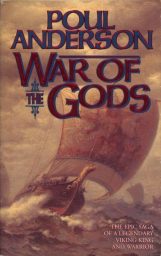 Fiction (DMR Books): Few authors have channeled “The Northern Thing” quite like the great Poul Anderson. The ancient Norse myths and Sagas ran strong in his Scandinavian blood, even when he was writing reams of science-fiction set in the vast reaches of space. At various points in his career the seven-time Hugo winner returned to Mimir’s Well for another draught of cold Northern waters, including 1997’s War of the Gods (Tor).
Fiction (DMR Books): Few authors have channeled “The Northern Thing” quite like the great Poul Anderson. The ancient Norse myths and Sagas ran strong in his Scandinavian blood, even when he was writing reams of science-fiction set in the vast reaches of space. At various points in his career the seven-time Hugo winner returned to Mimir’s Well for another draught of cold Northern waters, including 1997’s War of the Gods (Tor).
History (Art of Manliness): Undoubtedly, the Civil War was the most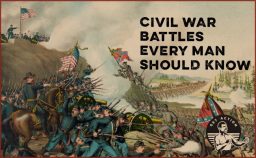 consequential event in American history. The fate of the fledgling nation — geographically, culturally, existentially — hung in the balance between the years 1861 and 1865.
consequential event in American history. The fate of the fledgling nation — geographically, culturally, existentially — hung in the balance between the years 1861 and 1865.
Despite its significance, the average American doesn’t possess a very expansive understanding of the conflict. Most of us know a few names — Grant, Lee, Sherman, Jackson; we know Lincoln gave an important speech at Gettysburg; and we know who won the war. But our grasp of everything else is often fairly hazy.
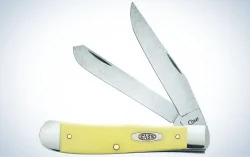 Knives (Field & Stream): What makes the best pocket knife? Well, it has to ride easily in the pocket of your favorite pants for starters, but when you take it out, it also has to do exactly what you want it to. So what do you want? Something hyper-functional, as in a multi-tool that does what any knife would do and more. A simple blade to handle those tasks that pop up every day. Or something that just feels right in your hand.
Knives (Field & Stream): What makes the best pocket knife? Well, it has to ride easily in the pocket of your favorite pants for starters, but when you take it out, it also has to do exactly what you want it to. So what do you want? Something hyper-functional, as in a multi-tool that does what any knife would do and more. A simple blade to handle those tasks that pop up every day. Or something that just feels right in your hand.
Paperbacks (Tom McNulty): When you pick up a book you’re embracing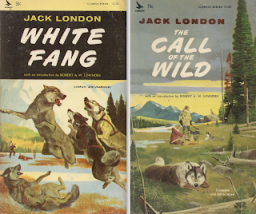 someone else’s dream, and you are now complicit in that dream. This is an effort to make sense of the dark and endless universe which seemingly spirals out of control around us; vast, menacing and whose purpose is unknown. We strive to understand that purpose; we long for understanding and a solution to all of that which plagues our dreaming lives.
someone else’s dream, and you are now complicit in that dream. This is an effort to make sense of the dark and endless universe which seemingly spirals out of control around us; vast, menacing and whose purpose is unknown. We strive to understand that purpose; we long for understanding and a solution to all of that which plagues our dreaming lives.
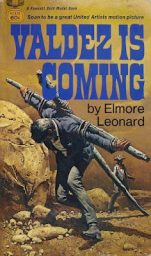 Westerns (Paperback Warrior): Thus far, I’ve enjoyed everything Elmore Leonard (1925-2013) has written. From westerns like Escape from Five Shadows (1956) and Last Stand at Saber River (1959) to crime-fiction like Mr. Majestyk (1974). Arguably, one of his best western novels is Valdez is Coming. It was originally published in 1971 and was adapted into a 1974 movie starring Burt Lancaster.
Westerns (Paperback Warrior): Thus far, I’ve enjoyed everything Elmore Leonard (1925-2013) has written. From westerns like Escape from Five Shadows (1956) and Last Stand at Saber River (1959) to crime-fiction like Mr. Majestyk (1974). Arguably, one of his best western novels is Valdez is Coming. It was originally published in 1971 and was adapted into a 1974 movie starring Burt Lancaster.
Review (Pulp Fiction Reviews): Max Allan Collins has been writing stories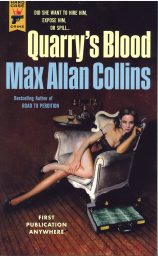 about his Vietnam veteran hitman since 1976. It was obvious from the start that the author and his creation were the same age making it easy enough for him to place the stories in time. Collins did a few Quarry books and then walked away from them. When Hard Case Crime came along, publisher Charles Ardai, a fan of the character, urged Collins to bring Quarry back.” Collins, obviously older, as was his hero, realized he had a golden opportunity to write a finale.
about his Vietnam veteran hitman since 1976. It was obvious from the start that the author and his creation were the same age making it easy enough for him to place the stories in time. Collins did a few Quarry books and then walked away from them. When Hard Case Crime came along, publisher Charles Ardai, a fan of the character, urged Collins to bring Quarry back.” Collins, obviously older, as was his hero, realized he had a golden opportunity to write a finale.
Review (Bloody Spicy Books): t’s really damned surprising that it’s taken me this long to talk about a Fargo novel on the blog. I’ve really had a blind spot in my reading history with westerns, it’s something I plan on working on this year (because of a project I’m working on) and I’m sure you (the reader) will see more and more westerns being reviewed, especially because I’ve been buying ’em the bucketful.
Fiction (Livia J. Washburn): HOLLYWOOD IN THE 1920s, WHERE THE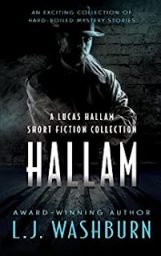 GLITZ AND GLAMOR OF THE SILENT MOVIE ERA CONCEALS DARK AND DANGEROUS SECRETS, AND ONE OLD COWBOY USES FRONTIER CUNNING AND GUN-SKILL TO UNCOVER THE TRUTH AND DELIVER JUSTICE IN THIS COLLECTION OF HARD-BOILED MYSTERY STORIES.
GLITZ AND GLAMOR OF THE SILENT MOVIE ERA CONCEALS DARK AND DANGEROUS SECRETS, AND ONE OLD COWBOY USES FRONTIER CUNNING AND GUN-SKILL TO UNCOVER THE TRUTH AND DELIVER JUSTICE IN THIS COLLECTION OF HARD-BOILED MYSTERY STORIES.
Tolkien (The Federalist): f you thought the epic works of J.R.R. Tolkien could survive adaptation into a billion-dollar TV series by Amazon without being saddled with the dreary ideology of corporate wokeness, or without being marred by executives and show-runners who think they can improve on Tolkien’s vast mythopoeia, you were wrong.
Science Fiction (Sorcerer’s Skull): I posed this question this question as the title of a blogpost the first time on February 15, 2013. It’s a topic that TV Tropes–unsurprisingly–has some thoughts on. This scale is a bit granular and more detailed (and perhaps a bit more judgey). Here’s my sort of summary of the basics of both of these:
August Derleth (Pulp Net): ontinuing my reading/re-reading of the Solar Pons stories, August Derleth‘s Sherlock Holmes pastiche, I now hit Vol. 6 of the Belanger Books set, which contains the only Solar Pons novels by Derleth: The Novels of Solar Pons: Terror Over London and Mr. Fairlie’s Final Journey.
Horror (Easily Distracted): The Caller of the Black by Brian Lumley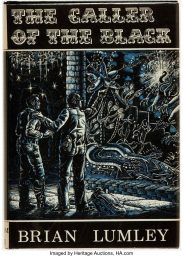 (Arkham House, 1971) contains stories that commit all kinds of sins to sound and sense. It’s a tyro work, and clearly a gamble for any publisher. Still, Derleth’s support for Lumley looks prescient today: the author has produced many stories and some novels of real merit, and many more that gave their readers hours of pleasure and escape.
(Arkham House, 1971) contains stories that commit all kinds of sins to sound and sense. It’s a tyro work, and clearly a gamble for any publisher. Still, Derleth’s support for Lumley looks prescient today: the author has produced many stories and some novels of real merit, and many more that gave their readers hours of pleasure and escape.
Great posts all, but I have to recommend the broad range of opinions re: Sci-fi vs. fantasy at John Wright’s blog.
What a set of links: ERB, Jack London, Elmore Leonard, Moorcock, Anderson, Lumley, Conan and knives. Not to mention that discussion at John Wright’s blog that Mr. Tuggle points out.
Thanks!